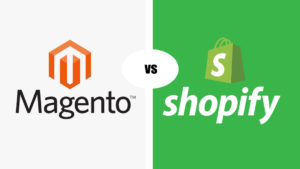Which E-Commerce Platform is Best For My Business?

Which E-Commerce Platform is Best For My Business?
Magento vs Shopify vs Shopify Plus
If you’ve searched for an e-commerce platform or software to run your online business, you’ve probably come across Shopify, Shopify Plus or Magento. These are the three well-known and widely used e-commerce solutions for anyone who wants to create, manage, update and maintain an online store. However, for many, knowing the type of e-commerce platforms available is not a problem. Choosing the best platform is considered the biggest challenge.
So, if you have been wondering which e-commerce platform to choose between Shopify, Shopify Plus, and Magento, we’ll help you sort it out. We have highlighted some of the basic differences between these e-commerce platforms and put together a detailed comparison to help you make an informed decision. Read on to learn more.
Magento vs Shopify vs Shopify Plus
Let’s Do a Breakdown of the Differences
Background
Magento
Was launched in 2009 and since then it has grown and become the leading open source platform with more than 30 percent of the total e-commerce market share. Currently, this software powers more than 260,000 online stores across the world. Some of the biggest companies this software product powers include Olympus, Ford, and Coca-Cola.
Shopify and Shopify Plus
Are described as cloud-based enterprise platforms for building e-commerce stores. Currently, these two holds around 11% of the total e-commerce market share and boast more than 500,000 merchants across the world. Don’t get confused here. Shopify and Shopify Plus are the same platform only that the later has been packed with more features. This is the reason it is best for enterprise-class merchants. In fact, some of the biggest brands that use the platform include Budweiser, Tesla, the Economist and Water Aid.
If So, Can Your Customers Easily Find You? Check Here to Find Out
Multi-Store Management
One drawback about Shopify and Shopify Plus is that both do not allow users to manage several e-commerce stores from one interface. So if you are a merchant planning to manage several brands and stores within a single interface, these platforms won’t be the best option for you.
One of the key selling points of Magento is the ability to run several brands and stores from one interface. This means you can use it to manage several businesses that use different languages or domains.
Hosting and Customization
Shopify and Shopify Plus are fully hosted e-commerce solutions. With these platforms, you don’t have to pay for hosting because the platforms run on the company’s server. If you don’t know any coding or you don’t want to pay for someone to do so, a hosted platform is best for you. With a fully hosted platform, you also don’t have to worry about your online store updates because the company servers automatically update your site.
Magento, especially the Community version, is a free self-hosted platform. This platform gives you a degree of control over your e-commerce store that fully hosted solutions cannot match. You hire a developer to make any changes you want such as additional features, extensions, and plugins. Another advantage of a self-hosted platform like Magento is that you can move your store to another web hosting provider if you are not satisfied with their service.
Scalability
Magento is a little bit more flexible and comes with more advanced features than Shopify and Shopify Plus. The reason for this is that Magento’s platform uses PHP, one of the most advanced programming languages. Magento also offers users a chance to access technology stack and set up multiple currencies and languages.
Shopify and Shopify Plus Platforms are widely used thanks to their simplicity and ease of use. These two also takes less time to implement and provides ergonomic interfaces once implemented. The Shopify plans have limited features but Shopify Plus can be matched with that one of Magento. But regardless, these three e-commerce platforms can be customized to withstand and scale up when there is an increase in traffic.
Pricing
- Shopify Plans
There are three normal Shopify plans, each with a different price as explained below:
- Basic Shopify: This is ideal for anyone starting a new business. It costs $29 per month and charges 2.9% + 30¢ credit card rates, and 2.0% transaction fee. With this plan, you will get 2 staff accounts.
- Shopify: This includes everything you need for your growing online business. It costs $79 per month and charges 2.6% + 30¢ credit card rates, and 1.0% transaction fee. With this plan, you will get 5 staff accounts.
- Advanced Shopify: This plan includes advanced features for scaling your business. It costs $299 per month and charges 2.4% + 30¢ credit card rates, and 0.5% transaction fee. With this plan, you will get up to 15 staff accounts.
- Shopify Plus
Unfortunately, the company has not revealed the fee for Shopify Plus on its official website. The reason for this is because the higher amounts which go beyond $2,000 per month could scare or discourage some smaller businesses who might be interested in normal Shopify Plans. So to get the best quote, you need to fill in a form on their website including the URL of your website. The company will analyze your website and come up with the best pricing information. In a nutshell, the cost for running a store on Shopify Plus will consist of:
- Shopify Plus platform fees
- Payment gateway fees
- App fees
- Maintenance Fees
3. Magento
Magento Community Edition is a free open source software. This means you can download it for free and the make changes to it to suit your preferred requirements. You can also choose Magento Enterprise Edition which costs ranges from $22,000 to $32,000 per year. Another option is the Magento Enterprise Cloud Edition, a fully hosted version whose license starts at $2,000 a month. This cost normally increases depending on the size of merchant and customer turnover. This means you will not pay the same price as big e-commerce sites.
“So, Which E-commerce Platform Is Best for My Business, You Ask?”
From the comparison above, you may know what you want on an e-commerce platform. If you are still confused, below are some of the key questions you need to ask yourself:
- Can it grow with me?
- Can I afford it?
- Can I make it look beautiful?
- What is the platform like for the end-user?
- Does the platform give me the features I want?
- If it is a hosted platform and will I get the support I need?
- Is it secure?
So there is no straightforward answer to the above question. Basically, if you don’t need multiple currency checkouts, multiple store solutions or advanced custom integration, then we recommend you consider Shopify or Shopify Plus.
Though if you want a more complex, integrated and customized e-commerce platform, then Magento Community Edition might be an ideal platform for you.
Though we have revealed some key features about each solution, there are still many things to be said about each. I recommend reading Forrester’s Study on the future of B2B e-commerce platforms and how B2B buyers are quickly redefining the e-Commerce landscape.
Still, not sure which e-commerce platform is the best for your business? Perhaps a conversation with one of our web design experts might be in order.
Contact Big Hit Creative Group for a consultation.




